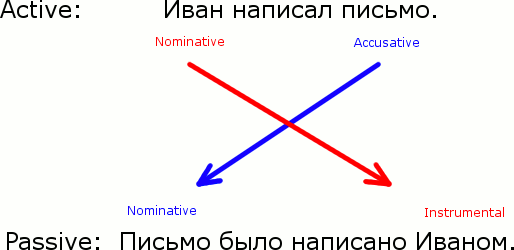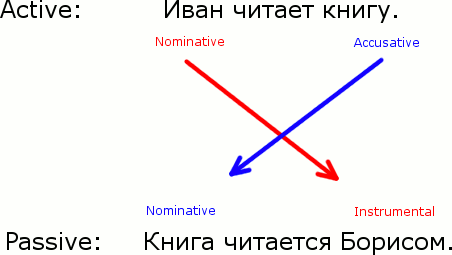
A verb that has both a subject (“doer”) in the nominative case and a direct object (“done-to”) in the accusative case is called a “transitive” verb. Examples:
| Таня прочитала статью. | Tanya read the article. |
| Иван открыл дверь. | Ivan opened the door. |
| Вор укрыл мои часы. | A thief stole my watch. |
Sometimes a verb has both a doer and a done-to, but the done-to is not in the accusative case; that is, the done-to is not a direct object, but a dative object or genitive object or a prepositional object. Such verbs are “intransitive” verbs:
| Таня говорила о статье. | Tanya talked about the article. |
| Иван звонил Тане. | Ivan called Tanya. |
| Немцы напали на Россию. | The Germans attacked Russia. |
Thus the sentences in sample set 1 are transitive sentences, but the sentences in sample set 2 are not. For the purposes of this discussion, an active sentence is the same thing as a transitive sentence.
Many active sentences can be rephrased into passive sentences. A passive sentence is one where the done-to is expressed in the nominative case, and the doer (if expressed at all) is in the instrumental case. When the doer is expressed by the instrumental in a passive sentence, we no longer call it the “subject,” but rather the “agent”:
| Статья | была прочитана | Таней. |
| The article done-to subject nominative |
was read | by Tanya doer agent instrumental |
If you have a transitive sentence that uses a perfective verb, that sentence can often be transformed into a passive sentence. To make a perfective transitive sentence passive:
Example:

Here are a set of examples to examine:
| Active | Passive | ||
| Ivan will write the letter. | Иван напишет письмо. | Письмо будет написано Иваном. | The letter will be written by Ivan. |
| Ivan has written the letter. | Иван написал письмо. | Письмо написано Иваном. | The letter has been written by Ivan. |
| Ivan had written the letter. | Иван написал письмо. | Письмо было написано Иваном. | The letter had been written by Ivan. |
| Active | Passive | ||
| Vera will receive the file. | Вера получит файл. | Файл будет получен Верой. | The file will be received by Vera. |
| Vera has received the file. | Вера получила файл. | Файл получен Верой. | The file has been received by Vera. |
| Vera had received the file. | Вера получила файл. | Файл был получен Верой. | The file had been received by Vera. |
| Active | Passive | ||
| The bank will send me money. | Банк пошлёт мне деньги. | Деньги будут посланы мне банком. | The money will be sent to me by the bank. |
| The bank has sent me the money. | Банк послал мне деньги. | Деньги посланы мне банком. | The money has been sent to me by the bank. |
| The bank had sent me the money. | Банк послал мне деньги. | Деньги были посланы мне банком. | The money had been sent to me by the bank. |
Although there is a present passive participle (which is of course imperfective), it is very rarely used in Modern Russian. There are also a few past passive participles that are imperfective, but they are essentially not used in Modern Russian except in stylistically marked artistic literature. Those participles are not normally used to make imperfective passive sentences in modern Russian. In their place, the reflexive form of the imperfective verb is sometimes used in a passive sense.
The use of the reflexive verb for passive meaning is almost entirely restricted to imperfective verbs. To make an imperfective transitive sentence passive:
Example:

Here are a set of examples to examine:
| Active | Passive | ||
| Ivan will read the book. | Иван будет читать книгу. | Книга будет читаться Иваном. | The book will be read by Ivan. |
| Ivan is reading the book. | Иван читает книгу. | Книга читается Иваном. | The book is being read by Ivan. |
| Ivan was reading the book. | Иван читал книгу. | Книга читалась Иваном. | The book was being read by Ivan. |
| Active | Passive | ||
| American scientists will research this issue. | Американские учёные будут исследовать этот вопрос. | Этот вопрос будет исследоваться американскими учёными. | This issue will be researched by American scientists. |
| American scientists are researching this issue. | Американские учёные исследуют этот вопрос. | Этот вопрос исследуются американскими учёными. | This issue is being investigated by American scientists. |
| American scientists were doing research on this issue. | Американские учёные исследовали этот вопрос. | Этот вопрос исследовался американскими учёными. | This issue was being investigated by American scientists. |
| Active | Passive | ||
| Many scientists will discuss this theory. | Многие учёные будут обсуждать эту теорию. | Эта теория будет обсуждаться многими учёными. | This theory will be discussed by many scientists. |
| Many scientists will discuss this theory. | Многие учёные обсуждают эту теорию. | Эта теория обсуждается многими учёными. | This theory is being discussed by many scientists. |
| Many scientists were discussing this theory. | Многие учёные обсуждали эту теорию. | Эта теория обсуждалась многими учёными. | This theory was being discussed by many scientists. |
Imperfective passive sentences are subject to an additional restriction that does not apply to perfective passive sentences: generally, an imperfective passive sentence cannot have an animate subject.
Passive sentences are used when the speaker/writer wished to de-emphasize the agent (“doer”) of the verb. Since the agent is less important, passive sentences often leave out the agent entirely:
| The last car has already been sold. | Последняя машина уже продана |
| The theory has been proven. | Теория уже доказана. |
| “Zdravstvuyte” is written with two V's. | «Здравствуйте» пишется через два в. |
| “Zdravstvuyte” is translated into English as “hello.” | «Здравствуйте» переводится на анлгийский как «hello». |
A passive sentence in English can often be translated into Russian by either a passive sentence or an indefinite personal sentence:
| True passive | Indefinite personal | |
| The vodka has already been drunk. | Водка уже выпита. | Водкy уже выпили. |
| The building has already been built. | Дом уже построен. | Дом уже построили. |
A passive sentence in English can often be translated into Russian by an active sentence with inverted word order:
| The car was purchased by my brother. | Машину купил мой брат. |
Rev. 2:37 PM 2/6/2020